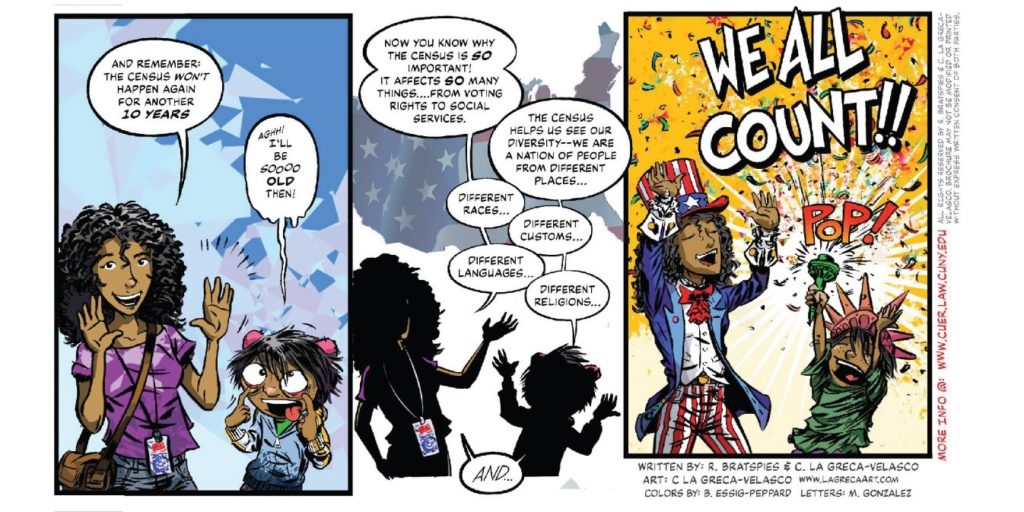We All Count—The 2020 Census in the Era of Covid19, by Rebecca Bratspies
The federal government has conducted 23 decennial censuses. The 2020 census will be the 24th. You can complete the 2020 census here using the 12-digit code you should have received in the mail. If you do not have your code, you can still complete the census!
Conducted in the shadow of coronavirus, this census will be like no other. In more ordinary times, census workers would go door-to-door in hard-to-count areas, to supplement the mail-in or on-line submissions that are the major data-gathering thrust of this 24th census. Experience from the 2010 census showed that door-to-door efforts were critical for reaching hard-to-count demographics. However, in the midst of a global pandemic, stay-at-home orders make that personal contact impossible.

In order to help get a good count, the CUNY Center for Urban Environmental Reform (CUER) partnered with graphic artist Charlie LaGreca to create a census comic book. A mobile-friendly version of the comic is available here. CUER’s comic book addresses three of the hardest-to-count cohorts: 1) disaffected young people who view themselves as transient residents rather than part of a community; 2) children under five, whose parents forget to add them; and 3) people with insecure immigration status, and/or minority communities that have historically experienced over-policing. These three communities were significantly undercounted in the 2010 census. That undercount had wide ramifications for funding, political representation, and the provision of social services. This undercount also impacts environmental justice analyses, which typically start with census block data.
In this undercount, we see modern reverberations of the census’s racially charged origins. Article 1, Section 2 of the US Constitution requires a census. In its original constitutional form, the census counted “the whole Number of free Persons, including those bound to Service for a Term of Years, and excluding Indians not taxed, three fifths of all other Persons.” It took until the passage of the 14th Amendment to fully count African-Americans, and until the 1968 Indian Civil Rights Act to fully count the nation’s first peoples.
Having an accurate count is critical because “[r]epresentatives and direct Taxes shall be apportioned among the several States which may be included within this Union, according to their respective Numbers.” In other words, the House is reapportioned after every census, and tax dollars are divvied up based on the census.
The constitutional mandates that “[t]he actual Enumeration shall be made … within every … Term of ten Years, in such Manner as they shall by Law direct” gives Congress wide discretion to set the parameters for the information to be collected and the manner of its collection.
By statute, Congress has made census information confidential, and has explicitly provided: “In no case shall information furnished under this section be used to the detriment of any respondent or other person to whom such information relates.” Wrongful disclosure of census information is a felony punishable by 5 years imprisonment and/or a $250,000 fine. Census data remains confidential for seventy-two years and is then released to the public. Data from the 1940 census was released in 2012.
Over time, the information collected through the census has changed. For example, from 1870 through 1950, various kinds of immigration data was collected as part of the census. This data was not collected as part of the ordinary census from 1960 through 2010 because the government developed more accurate ways to count the country’s non-citizen population. The Trump administration sought to reintroduce questions about immigration status into the 2020 census. However, in the Summer of 2019, the Supreme Court ordered that a census question about immigration status be removed from the 2020 Census on the ground that Commerce Secretary Wilbur Ross’s expressed reason for adding the question was pretextual, and therefore arbitrary and capricious.

Rebecca Bratspies is a Professor of Law at the CUNY School of Law and the founding director of the CUNY Center for Urban Environmental Reform.



